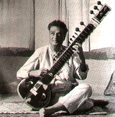Abdul Halim Jaffer Khan
| Abdul Halim Jaffer Khan | |
|---|---|
 |
|
| Background information | |
| Born |
February 18, 1927 jaora,Madhya Pradesh, India |
| Died |
(aged 89) Mumbai, India |
| Genres | Hindustani classical music |
| Occupation(s) | Sitarist, Composer, Innovator, Author |
| Instruments | sitar |
| Labels | Various |
| Associated acts | Ravi Shanker, Vilayat Khan, Julian Bream, Dave Brubeck, Zunain Khan |
| Website | www.jafferkhanibaaj.com |
Abdul Halim Jaffer Khan (February 18, 1927 – January 4, 2017) was an Indian sitar player. Khan received the national awards Padma Shri (1970) and Padma Bhushan (2006) and was awarded the Sangeet Natak Akademi Award for 1987.
Abdul Halim Jaffer Khan is regarded as one of the 'Sitar Trinity' of India along with Ravi Shankar and Vilayat Khan and is the youngest of them. He was born in 1927, in jaora (35 km near ratlam), Madhya Pradesh as the son of Jaffer Khan, a versatile vocalist, sitarist and beenkar. He hails from the Beenkar Gharana of Indore. He has been a distinguished All India Radio Artiste since the early 1940s. A few years before the Beatles met Ravi Shankar, in 1958, Khan collaborated with jazz pianist and composer Dave Brubeck. Brubeck who was in Bombay through the U.S. State Department sponsored Jazz Ambassadors Program was impressed by the improvisation in Indian music and said that the experience accompanying Halim Jaffer Khan led him to play in a different way. Brubeck says of that meeting, "We understood each other." Khan also performed with the noted English classical guitarist Julian Bream in 1963.
Khan is perhaps best known for his innovation, Jafferkhani Baaj. He describes it as, "a synthesis of precision in technique, systematic thought" with a vigorous playing style. Cultural anthropologist and reader at the University of Mumbai, Dr. Kamala Ganesh states: "His music making is full of eclectic yet deeply informed choices. He is a thinking musician but puts across his complex views with a simplicity and feeling which demarcate the articulate performer from the articulate theoretician.... In him, one gets an unmistakable sense... a syncretic tradition". The Indian santoor player Shivkumar Sharma remembers of Khan's performance of the raga Chaayanat: "It was probably in 1955–56, I was relaxing in my terrace in Jammu. In the stillness of the night I heard the notes of Raga Chaayanat on the sitar emanate from my neighbor's radio. I immediately noticed that the tone of the sitar was completely different and the style of playing radically unique. I rushed to switch on my radio.... I was totally engrossed and was very curious to know who this maestro was."
Khan has been credited with bringing Carnatic ragas Kirwani, Kanakangi, Latangi, Kirwani, Karaharapriya, Manavati, Ganamurti, and others into the sitar repertoire, rendering them through a Hindustani sensibility and in the Jafferkhani style. He was the first Hindustani musician to collaborate with Carnatic music in a performance with renowned Veena player Emani Sankara Sastry. His early experimentation with polytonality in Indian classical instrumentation (which is largely solo performance) was achieved in his sitar quintet.
...
Wikipedia
